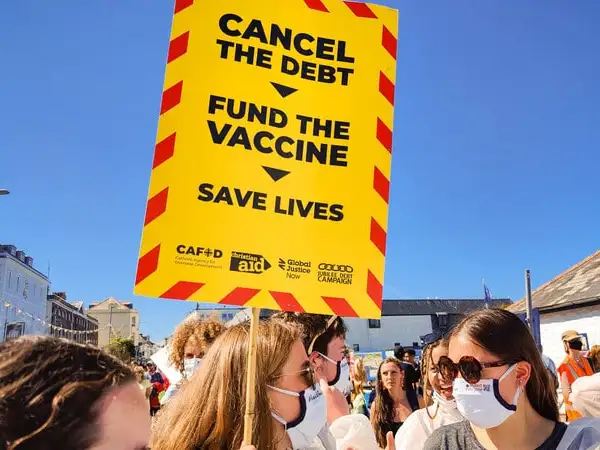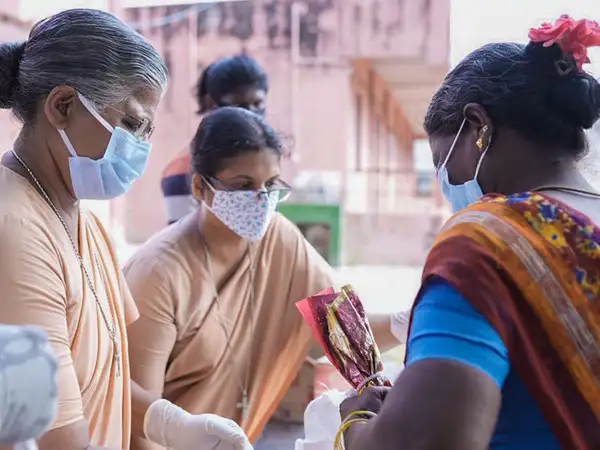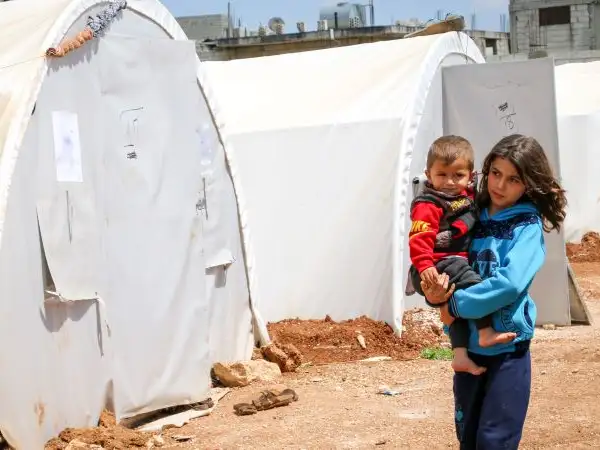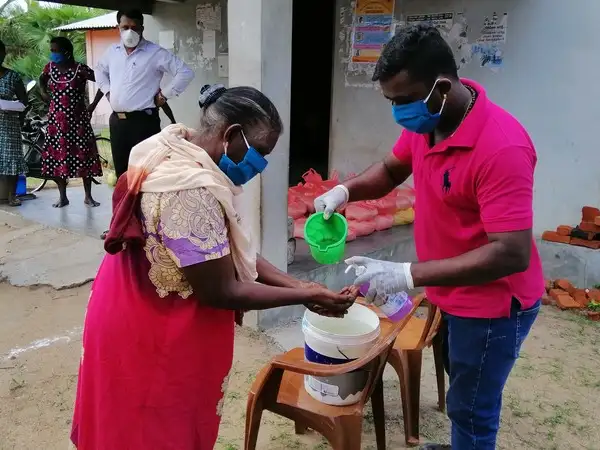G7 2022: More has to be done to achieve a global vaccine roll-out
G7 leaders failed to set out the action needed to rapidly roll out vaccines in low-income countries.


Thousands of CAFOD supporters have called for debt cancellation so people in marginalised communities can access healthcare and vaccines
As the coronavirus pandemic swept around the world, CAFOD worked quickly with Church partners to coordinate our response to launch our Coronavirus Appeal. Your donations have helped communities survive lockdowns and prevent coronavirus.
This work depends on our network of local experts, volunteers and community carers. They are known, they are trusted, and they can get help to people, fast – even in the most remote places and difficult situations.
As we all start to return to normal, we want to say a heartfelt thank you. Your support, prayers and donations are helping to transform the lives of those affected by the pandemic, all around the world. This work would not be possible without you.
We are truly humbled by the generosity of our volunteers and supporters to our Coronavirus Appeal. So far, you have given over £7 million and have helped support work in 35 countries.
Thank you for reaching out to our global family during such difficult times. Your donations have made such a difference and are continuing to do so.
You have helped to:
Raise awareness and prevent misinformation: 3,225 community volunteers spread awareness locally
Provide clean water and food
Provide medical supplies such as face masks, PPE, and oxygen tanks
Provide support services for our church partners working with communities, such as training for priests and hospital chaplains and enhanced IT systems
Help increase capacity of local healthcare workers: 1,087 clinical staff and community health care workers were trained in the management of coronavirus responses


CAFOD supported Caritas India's response to the second wave of coronavirus in the country
We pledged £400,000 to our long-term partners and supported Caritas India. Thanks to your donations, they were able to, and continue to, support some of the most vulnerable households in India by:
providing PPE to frontline health workers
distributing medical kits to people with manageable symptoms
setting up safely run isolation and quarantine centres
promoting lifesaving Covid and vaccine information
The civil war in Syria has left an estimated 6.5 million people homeless inside the country. Now they face the threat of coronavirus when many cannot socially distance, access healthcare, or find clean water.
We are working with local aid experts in unregistered displaced peoples camps to construct Water, Hygiene and Sanitation (WaSH) facilities and distribute PPE to prevent the spread of the virus. In other areas we are supporting our local aid teams to distribute food, hygiene kits and cash to allow the most vulnerable families survive lockdown measures.


The coronavirus pandemic has meant millions of people in Syria are at risk from the virus and from overstretched health services.
We have been working with local church radio networks and aid experts to deliver vital hygiene messages via radio, in hard-to-reach areas. Community groups are translating these messages into local languages so that they can be heard and understood by as many people as possible.
We are also working with women’s groups to protect women of all ages from the risk of domestic violence during lockdown.
We have been working with faith leaders to raise awareness about coronavirus through TV, radio and megaphones - helping more families survive the pandemic through targeted distribution of hygiene kits. We have provided emergency food, clean, safe water and housing to families who have fled fighting and are vulnerable to coronavirus in eastern DR Congo.
Health and prevention advice are also being shared when our staff and volunteers are giving out soap and emergency food packages to vulnerable families in Ethiopia, Zimbabwe, Nigeria and Kenya, to ensure that those at particular risk of the virus can survive this crisis.
Your donations have also funded PPE for medical staff at clinics in Zimbabwe and Sierra Leone.
In the Middle East, our local experts are using your donations to continue their vital peacebuilding work and ensuring that legal advice can be given online.
Volunteers and priests are delivering emergency food parcels to vulnerable families in the West Bank and we are also reaching out to Bedouin communities with health equipment and information.
Staff and volunteers are also in vulnerable communities in Afghanistan, Sri Lanka and Cambodia. They are spreading essential health messages through village posters, socially-distanced visits to families and giving out PPE.


Food and hygiene packages have been distributed to households headed by women, including people living with disabilities, daily wage earners, and families from minority religious and ethnic groups who are often subjected to exploitation and discrimination.
In Bangladesh we moved quickly to give cash to the poorest families – led by widows, or those living with disabilities - to buy life-saving food and PPE during the crisis.
Across Central and South America, your donations are funding radio broadcasts that share life-saving information on coronavirus and how to prevent it.
Church leaders and volunteers have been reacting quickly to get emergency food and seeds to remote communities and help rural farmers get their crops to hungry families on the edges of cities.

The Emergency Response Team is funded by our loyal regular donors who have chosen to specifically support our emergencies work.
Many humanitarian situations can escalate quickly so having regular donations that we can depend on gives us the flexibility and agility we need to respond and react to emergencies whenever they strike.
You can also now sign up to receive prayer texts for when there is an emergency.
Lessons learned from the Ebola outbreaks in Sierra Leone, Liberia and the Democratic Republic of the Congo meant that our local teams rapidly reached out to faith leaders with accurate information and safely organised training sessions.
These leaders are rooted in their communities - a trusted presence - with exceptional reach and impact, ensuring that everyone receives the life-saving hygiene information they need.
The experience of our local networks mean that we can deliver clear and accurate information via trusted faith and traditional leaders, and promote good hygiene practices, which are both key to keeping people safe. These leaders are pivotal in making sure life-saving messages are acted upon and also in breaking down the prejudice that can be shown to sufferers and survivors of a disease.
CAFOD, along with other faith organisations, is urging the international community to lead a new vision after this crisis, where the planet is respected, inequalities are reduced, and where basic services and rights are guaranteed for every human being.
Pray with us during the coronavirus emergency
Caritas Internationalis, the global Church network CAFOD is part of, has a local presence in 165 countries. Together, we make up one of the largest aid networks in the world, with substantial knowledge and expertise in WASH – water, hygiene and sanitation – and disease control.
CAFOD holds significant technical expertise in WASH and helps to coordinate Church responses.
But even as part of this global network of local experts, coronavirus risks disrupting our ongoing humanitarian and longer-term development work.
Every country team is adapting to the challenges this crisis demands, but we will make sure that local staff and aid teams on the ground put their safety first in order to continue delivering help where it is needed most.
G7 leaders failed to set out the action needed to rapidly roll out vaccines in low-income countries.
With your help, our sisters and brothers can survive coronavirus and also rebuild their lives – with love, dignity and hope.
With thanks to generous donations from supporters, you have helped to save lives in Brazil. Watch our short video to see how you have made a difference.
Thanks to your support, volunteers have been trained to help local people through the grief, stress and anxiety that have arisen during this time.
As the coronavirus crisis took hold last year, it impacted communities in every country CAFOD works in. The Catholic community in England and Wales responded with selflessness, compassion and love.
As Covid-19 continues to wreak havoc across the world – decimating people’s livelihoods, and leaving health systems struggling to provide healthcare and vaccines for the entire population – the Catholic Church should be seen as vital partner.
On World Radio Day, see how your support is helping us to broadcast trusted information to the most vulnerable people in Latin America and Africa.
The petition calls on the UK Prime Minister to push for debt cancellation for developing countries to avoid millions being pushed into poverty by the coronavirus pandemic.
Low and middle-income countries often have to spend more on paying back their debts than on healthcare, education or welfare.